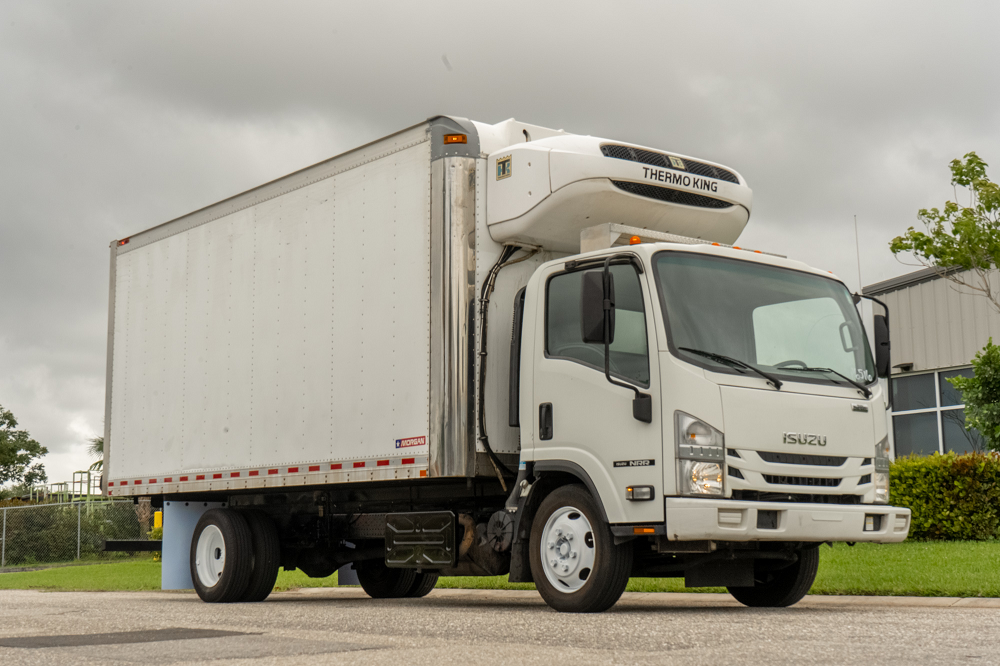Ever wonder what those big trucks with ‘Refrigerated’ emblazoned on the side are all about? As the name suggests, refrigerated trucks, or ‘reefers’ as they’re commonly called, are designed to keep their cargo at a set cool temperature during transport. If you’ve eaten fresh produce, meat, or dairy recently, chances are it made its way to your local store in one of these chiller trucks. Refrigerated trucks allow businesses to safely transport temperature-controlled goods over long distances. From fresh flowers to frozen fish filets, reefers carry a variety of perishable products that you probably didn’t realize needed cooling to make it from point A to point B. Next time you see one of those big refrigerated trucks on the highway, you’ll know exactly why it’s so important – it’s keeping our food fresh and allowing businesses to operate at peak efficiency. The top uses of these chiller trucks may surprise you.
Transporting Perishable Food Items
Refrigerated trucks, or reefer trucks as they’re often called, are essential for transporting temperature-sensitive cargo. Their main use? Delivering perishable food items fresh and safe.
Perishable foods like meats, dairy, and produce require strict temperature control to avoid spoilage during transport. Reefer trucks are refrigerated units that maintain the ideal temperature range for the particular food being hauled. For example, frozen foods are kept at 0 degrees Fahrenheit or below, while produce may require 45-55 degrees to stay fresh.
These chilled transports make it possible to deliver perishable goods over long distances and ensure quality. Without them, we wouldn’t have fresh seafood in landlocked areas, seasonal produce year-round, or imported delicacies from around the world.
Reefer trucks are also used for:
Transporting medical supplies like vaccines, tissue samples or temperature-sensitive medicines.
Hauling cut flowers and live plants.
Distributing frozen and chilled packaged food products to stores and restaurants.
In today’s global economy where goods are transported farther and more frequently, refrigerated trucks have become indispensable. They quite literally keep our food system moving and make the world a little bit smaller.
So the next time you pick up fresh strawberries in January or snap into an apple, spare a thought for the hardworking reefer trucks that made it possible. Our diets would be a lot less interesting without them!
Delivering Fresh Produce
When you think of refrigerated trucks, delivering fresh produce is probably one of the first uses that comes to mind. These temperature-controlled chiller trucks are essential for transporting fruits, vegetables, and other perishable goods.
Farmers and food suppliers depend on refrigerated trucks to get their harvests to market before they spoil. Picture those huge trucks hauling everything from leafy greens and berries to melons and tomatoes across the country. Without refrigeration, much of that produce wouldn’t make it to grocery store shelves still fresh.
Refrigerated trucks are also how many restaurants and food services receive deliveries of fresh ingredients. Whether it’s a multi-course meal at a fine dining establishment or a quick burger at a fast food joint, refrigerated trucks supply the raw goods to make it all possible.
Some other common uses of refrigerated trucks include:
Transporting dairy, meat, and seafood products. Things like milk, cheese, eggs, beef, poultry, and fish need to stay chilled.
Delivering frozen foods and pre-made meals. Everything from frozen dinners and pizzas to ice cream sundae bars arrive in refrigerated trucks.
Hauling flowers and plants. Exotic flowers, nursery stock, and live plants are often transported in temperature-controlled conditions.
Distributing pharmaceuticals and medical supplies. Many medicines, vaccines, blood products, and other healthcare materials require refrigeration during transport.
So next time you bite into a fresh strawberry or enjoy a cool glass of milk, you can thank a hardworking refrigerated truck for delivering the goods. Our food system depends on these chiller trucks to keep things fresh from farm to table.
Distributing Dairy Products and Eggs
Refrigerated trucks are essential for transporting dairy products and eggs. Without proper temperature control, these perishable goods can quickly spoil, jeopardizing public health and causing economic losses.
Transporting Milk and Other Dairy Products
Refrigerated trucks, often called “reefers,” are used to transport raw milk from dairy farms to processing plants where it is pasteurized and packaged for consumption. These trucks maintain temperatures around 38 to 40 degrees Fahrenheit to keep the milk fresh during transport. The same trucks then distribute cartons of milk, cheese, yogurt, and other dairy goods to supermarkets and distribution centers.
Some dairy producers also use refrigerated trucks to transport dairy byproducts like whey protein powder. Whey protein begins to degrade in quality if exposed to heat for too long, so chilled transport is necessary.
Distributing Eggs
Eggs require refrigeration to prevent salmonella growth and maintain freshness. Refrigerated trucks transport newly laid eggs from chicken farms to packaging facilities. They are then distributed to supermarkets, restaurants, and food service companies in the same chilled trucks.
Most eggs sold in the U.S. must be refrigerated. Only unwashed, farm-fresh eggs with the cuticle intact can be stored at room temperature. For food safety, all commercial eggs are washed and refrigerated, making refrigerated transport essential.
In summary, refrigerated trucks are vital for keeping dairy, eggs, and other perishable goods fresh and preventing foodborne illness. By strictly controlling temperatures during transport, these trucks allow us to enjoy nutritious and delicious dairy and egg products. The next time you crack open a cold egg or pour yourself a glass of milk, you can thank the hardworking reefer trucks that make it possible.
Carrying Flowers and Plants
Refrigerated trucks are essential for transporting temperature-sensitive cargo like flowers and plants. ###Maintaining the proper environment
To keep flowers and plants fresh during transport, refrigerated trucks carefully control temperature and humidity levels. The temperature is usually kept between 34 to 38 degrees Fahrenheit to prevent spoiling. The humidity is also closely monitored and kept moderately high, around 85 to 95 percent, to prevent the cargo from drying out or wilting.
Precise temperature control. Special refrigeration units cool the truck’s interior and can maintain the target temperature during transportation. Digital controls and monitoring systems help ensure consistent temperature regulation.
Humidity management. In addition to cooling the air, refrigerated trucks often humidify the air to create the ideal environment for plant and flower transport. The humidity is generated and regulated using built-in humidification systems.
Caring for the cargo
Delicate plants and flowers require specialized care and handling during transport:
Packaging. Plants and flowers are carefully packaged, often in cardboard boxes with ventilation holes, to protect them during loading, unloading and transit while still allowing proper air flow.
Securing the load. The packaged cargo must be properly secured inside the refrigerated truck using straps or other restraints to prevent shifting that could cause damage. The load should be evenly distributed for the most efficient cooling.
Monitoring. Drivers frequently check on the cargo to ensure the temperature and humidity levels remain in the proper range and that there are no issues with the refrigeration or humidification systems. The load is also checked at each stop to verify it remains secure.
By providing an optimal environment and careful handling, refrigerated trucks make it possible to ship fresh plants, flowers and other temperature-sensitive products over long distances. Their versatile temperature control and humidity management systems are essential tools for keeping perishable cargo viable during transportation.
Moving Medicines and Pharmaceuticals
Refrigerated trucks, also known as reefer trucks or chiller trucks, are essential for transporting temperature-sensitive goods like medicines and pharmaceuticals. ### Temperature Control
Medicines and drugs often have specific temperature requirements to maintain effectiveness and potency. Refrigerated trucks allow tight control over the internal temperature to keep contents at the ideal level. The trucks are heavily insulated and equipped with refrigeration units that can cool the trailer to temperatures as low as -20°F.
Temperature monitoring systems track the internal temperature to ensure it remains in the proper range during transit. If the temperature starts to fluctuate, the refrigeration unit will automatically adjust to correct it.
Secure Transport
Pharmaceuticals and medicines also require secure and hygienic transport conditions. Refrigerated trucks offer:
Locking mechanisms on doors and hatches to prevent unauthorized access.
Smooth, non-porous interior surfaces that are easy to clean and sanitize between loads.
Options for installing security cameras, GPS tracking, and alarm systems for high-value drug shipments.
Flexible Options
Reefer trucks come in a range of sizes to suit different transport needs. For medicines and drugs, options include:
Small straight trucks for local transport and last-mile delivery.
Mid-size trucks suitable for regional distribution.
Large semi-trailers for long-haul transport between warehouses, distribution centers, and ports.
Some reefer trucks also offer separate temperature controlled compartments within the trailer for transporting goods with different temperature requirements on the same load. This flexibility and temperature precision make reefer trucks ideal for transporting medicines, vaccines, and other pharmaceutical products. Keeping these temperature-sensitive goods at the proper temperature during transport is critical to maintaining quality and safety. Refrigerated trucks provide an efficient, secure, and carefully controlled environment for this sensitive cargo.
Conclusion
So there you have it, the main reasons refrigerated trucks are so useful for transporting temperature-controlled goods. Whether it’s fresh produce, frozen foods, medical supplies or anything else that needs to stay chilled, refrigerated trucks make it possible to ship these items over long distances while keeping them at the ideal temperature. Next time you pick up some fresh fish, imported fruit or a vaccine at your local store, you’ll know that a refrigerated truck likely helped that item make its journey to you while staying fresh. Refrigerated trucks may not seem that exciting, but they play an integral role in keeping our supply chains running and ensuring we have access to perishable goods that make our lives better.

